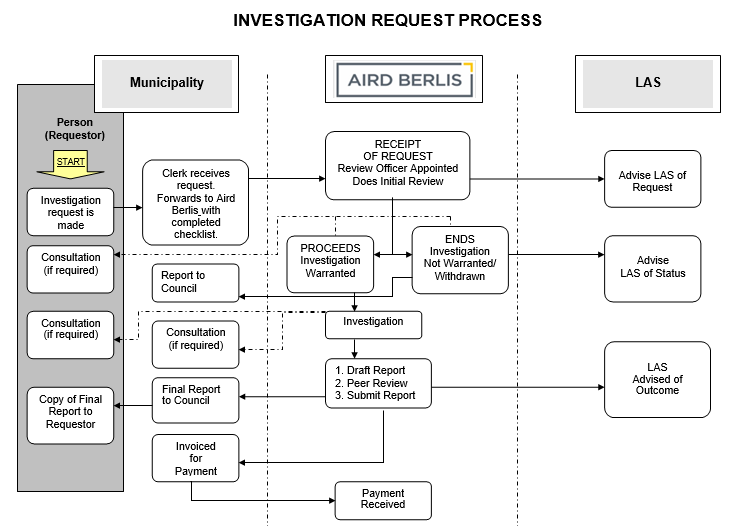Closed Meeting Procedures
Related Pages
Closed Meetings
An overview of Ontario’s open meeting rules and related matters involving closed meetings and procedures as set out below.
What is the Open Meeting Rule?
Are there exceptions?
What changes were made to the Municipal Act, 2001 regarding Closed Meeting Procedures?
In 2006, Bill 130 added to the Municipal Act, 2001 the ability for any person to request a review of the procedures of any closed meeting of a municipal Council or a local board (s. 239.2).
What does this mean?
As of January 1, 2008 any person can request that an investigation be undertaken respecting whether a municipality or local board, or a committee of either, has complied with the closed meeting rules contained within the Municipal Act, 2001 or a procedure by-law. Municipalities can appoint an investigator for this purpose but if a municipality chooses not to appoint an Investigator, the Ontario Ombudsman assumed the role and investigated the request.
What should be considered in appointing an Investigator?
A municipality can appoint any person to conduct investigations pursuant to the Municipal Act, 2001.
In making its selection, a municipality should consider that sections of the Municipal Act, 2001 were developed to enhance transparency and accountability – this should be considered in municipal decision-making.
Why appoint LAS as Investigator?
LAS offers this service because it is complementary to LAS’s existing program of municipal services whereby value can be enhanced through group procurement. LAS also believes that this initiative will assist municipalities in demonstrating that they are mature and accountable orders of government, capable of managing their own affairs.
LAS will include an educational component as a part of this program to help municipalities advance their knowledge base.
What is the Investigation Request Process?

Investigation Forms
Request for Closed Meeting Investigation forms can be downloaded here:
Closed Meeting Investigation Form
What Powers does the Investigator have?
An investigator is given significant powers to carry out its investigation, including the powers set out in s. 19 of the Ombudsman Act, including the authority to summons any person and examine them under oath, and to require any officer, employee or member of a municipality to provide such information and to produce such documents or things that the investigator requires. The investigator acts independently; neither the municipality nor the requester can direct or dictate the investigator’s actions in an investigation.
The investigator operates under a duty of confidentiality but is entitled to disclose such matters as it considers appropriate in any report and make such recommendations as may be relevant.
The investigator’s powers are paramount and its proceedings cannot be challenged, except for lack of jurisdiction, and no decision or report from the investigator can be challenged, reviewed, quashed or called into question in any court.
What Materials are required for the Investigator to undertake an Investigation?
While each investigation is unique and may require certain specific information, records or evidence be provided, the following materials are generally required:
- The original request for an investigation;
- A certified copy of the municipal procedure by-law and, if applicable, the procedure by-law for the local board;
- A certified copy of the municipal notice by-law and, if applicable, the notice by-law for the local board;
- A certified copy of the agenda with all relevant attachments or handouts relating to the meeting(s) in question, including any closed meeting materials;
- A certified copy of the notice given for the meeting(s);
- A certified copy of the minutes of the meeting(s);
- A certified copy of any audio or audio-visual recording of the meeting(s);
- A certified copy of any duties assigned by the municipality to the investigator;
- A certified copy of the municipality or local board’s investigation request or complaint procedure or protocol under s. 239.1 of the Municipal Act, 2001;
- A contact list for all members of the council, local board or committee about which the request is made and for all other persons present at the meeting(s), including mailing and email addresses and telephone numbers;
- Such other information or documentation that the Clerk deems relevant; and
- A completed copy of this checklist, dated, with the name and contact information of the person completing it.
Does the Investigator produce a report?
If the investigator determines that there has been a contravention of the procedure by-law or s. 239 of the Municipal Act, 2001, a report will be provided to the municipality or local board. The council or the local board are required to pass a resolution stating how they intend to address the report. The report must be made publicly available, and will be posted to this website.
